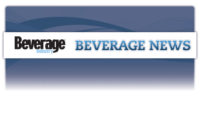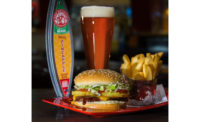Founded from humble beginnings 25 years ago, New Belgium Brewing started in the basement of its founder Kim Jordan and her husband, Jeff Lebesch, who, along with friends, produced the labels and delivered beer in their station wagon. Celebrating its quarter-of-a-century anniversary this year, the craft brewer has grown into a 1.5 million-barrel operation and is expanding beyond its Fort Collins, Colo., facility with the recent opening of a brewery and tasting room in Asheville, N.C. All the while, the company has maintained its longstanding commitment to producing world-class craft beers in an environmentally conscious way.
New Belgium began pouring its Belgian-inspired craft beers, including its flagship Fat Tire Amber Ale, at its new 500,000-square-foot facility on the banks of the French Broad River in May.
The new facility includes a brewery and Liquid Center tasting room, complete with an expansive outdoor patio and plenty of room for bike parking, the company says. Its distribution center is about eight miles east of the brewery and Liquid Center.
Inspired by a bike trip through Belgium and using a red bicycle as part of its logo and packaging, New Belgium began operations in 1991 with the vision of making world-class beers while minimizing its environmental footprint. In 2014, the company sold more than 945,000 barrels of beer across 39 states and the District of Columbia, the company says.
Now the fourth-largest craft brewery in the country, New Belgium produces 14 year-round beers, including Fat Tire Amber Ale, Ranger India Pale Ale, Slow Ride Sessions IPA and Citradelic Tangerine IPA, along with a gluten-reduced line, Glutiny Pale Ale and Glutiny Golden Ale. It also boasts a seasonal-release program and esoteric styles through its Lips of Faith series resulting in beers like La Folie, a sour brown ale aged up to three years in French oak barrels, the company says.
Recognizing that it takes a village to raise a brewery, and in alignment with the area’s transportation priorities, New Belgium donated land to the City of Asheville and the county to extend the French Broad River greenway, which, when complete, will run four miles along the river with connecting spurs into downtown, creating a 10-mile system, the company says.
“Our Asheville location allows us to become a national brewery and ship beer to the East Coast with a smaller footprint than if we shipped to the East Coast from Colorado,” says Susanne Hackett, New Belgium Brewing communications specialist. “Being located in a walk-able and bike-able urban setting also provides quality of life benefits to coworkers and visitors.”
Brownfield to brewery
With a strong commitment and love for its community, coworkers and the environment, New Begium’s employee-owners prioritized purchasing a brownfield site in Asheville to align with its sustainable in-fill and redevelopment strategy, instead of clearing virgin land.
“Urban redevelopment restores important ecosystem functions as well as offering a beautiful and uplifting community space, making the area more environmentally and socially sustainable,” Hackett says.
From its inception, New Belgium Brewing has sought to minimize resource consumption, maximize energy efficiency and recycle at every opportunity. Efficiencies throughout production have allowed New Belgium to achieve a four-to-one water-to-beer ratio, significantly lower than the industry average, according to the company.
By treating process water through an onsite water treatment plant, New Belgium is able to produce as much as 15 percent of its total electricity needs via methane-fired engines in Colorado, which effectively turns a waste stream into a commodity. The brewery is currently working to determine how it will use its methane-rich biogas at the Asheville brewery.
Additionally, New Belgium operates a 300 kilowatt solar array in Colorado, providing the brewery with 4.5 percent of its annual electricity needs. The Asheville brewery is starting with 19 kilowatts of solar panels and a solar thermal system, with aspirations of adding solar power down the road, the company says.
The following are other innovative features that the company has incorporated into the energy systems of its facilities: repurposed materials from deconstructed building on the site, LED lighting, high-efficiency cooling and distribution heating and cooling, solar hot water and PV, natural ventilation and HVAC and process heat recovery.
The craft brewer is pursuing Leadership in Energy and Environmental Design (LEED) certification for the Asheville brewery, distribution warehouse and Liquid Center tap room, it adds.
Fostering a similar handmade mentality, the 6,000-square foot riverside tap room features the work of local artists on handmade bars, tables and chairs, which are crafted from nearly 14 linear miles of repurposed wood salvaged from the stockyard formerly onsite, Hackett notes.
“A cantilevered deck sits above the new greenway and the French Broad River, local food trucks will be on site and an event lawn will open this summer to host bike-in movies and general outdoor fun,” she says.
CeleBEERation in Asheville
In celebration of its milestone 25th anniversary, CeleBEERation in Asheville will take place Aug. 27. It will be the official opening of the Asheville brewery.
“Customers can ride the greenway to the brewery and take in views of one of the oldest rivers in the world — while sipping an Asheville-brewed Fat Tire on the deck of the Liquid Center,” Hackett says.
“Truly, it’s been an honor to be part of this industry for the last 25 years,” she says. “We’ve seen and been part of a lot of change and innovation, and look forward to the next 25.”




